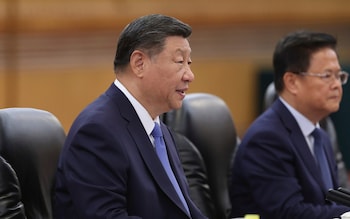
China should face tighter restrictions on accessing sensitive genetic data from millions of Britons, ministers have been warned, amid fears that the Government is going soft on Beijing.
Andrew Griffith, the shadow science secretary, warned that China’s access to UK health data is creating grave national security and privacy risks, which could be made worse if ministers build closer ties with Beijing.
Sir Keir Starmer has signalled a willingness to foster warmer relations with President Xi Jinping despite alarm over the threat posed by his country.
In a letter seen by The Telegraph, Mr Griffith warns Peter Kyle, the Science Secretary: “It has become clear that the Communist Party of China has sought to dominate critical industries such as genomics across much of the West.”
He said there was a growing threat to the UK that genomic technology could be “controlled and subsequently leveraged by our adversaries”.
The warning follows years of mounting concerns that Beijing is amassing vast troves of DNA data.

Experts claim that this is a crucial resource for China allowing it to gain a major advantage in developing new medicines as well as potentially biochemical weapons.
The previous Tory government had sought to reduce the threat of Beijing by conducting “risk assessments” over companies working on genomics research.
This included new plans to increase scrutiny over Chinese and Chinese-owned genomics companies.
Conservative ministers had planned to investigate how much data the UK shares with “certain companies”, Mr Griffith said, as he called on the new Government to do the same.
However, there are fears that Labour will be less willing to stage a clampdown on China.
Mr Griffith said he had “considerable concerns” over whether the new Government was committed to tackling risks from Beijing.
Mr Griffith said: “Whilst the last prime minister most recently described China as the ‘greatest state-based threat’ to the UK’s economic interests, the new Foreign Secretary has already doubled back on his previous commitments to address the threat China poses.
“This comes on top of senior Labour figures claiming that the new Government is seeking a warmer relationship with China.”
The US has already cracked down on China’s access to American data, last year adding a Chinese company which sells prenatal tests to pregnant women to a blacklist.
Washington claimed there was a risk that the information could be fed back into Beijing military programmes.
The same company, BGI, sold the prenatal tests at private clinics in the UK.
BGI also landed a Covid-19 testing contract during the pandemic and earlier this month was accused of stealing trade secrets from Oxford scientists.
BGI said it was surprised about the trade secrets allegation, which it repudiates. It said it would take all necessary actions to protect its legal rights and would vigorously defend itself against any allegations of misconduct.
A spokesman said: “Any allegations that BGI funnelled data to China are false.”
The group has maintained that its labs meet stringent standards in data security and that it has “never been asked to provide, nor provided, testing data to Chinese authorities for national security or national defence purposes”.
Following the pandemic testing contract, it said it had no access to patient data in the UK.
However, China’s National Intelligence Law dictates that Chinese companies must support, assist and cooperate with national intelligence efforts.

It comes amid significant scepticism over how transparent Beijing is over research in the country.
More than a quarter of scientists believe that the Covid-19 pandemic leaked from a Chinese laboratory near Wuhan during a research incident.
Beijing has denied any wrongdoing and claimed inquiries are politically motivated, although it has blocked attempts to access laboratories, research notebooks or sample databases.
The call for a crackdown was backed this weekend by Henry Smith, a former MP who sat on the foreign affairs select committee.
He said: “The new Government has the power to restrict such companies from public procurement where they pose national security, data privacy and ethical risks.”
He said this would align Britain more with the US.
A government spokesman said: “As part of the UK Biological Security Strategy, the Government is conducting a review to minimise biological data risks and strengthen the economic impact and job creation potential of the life sciences industry.
“We’re working with domestic and international partners to protect data privacy and improve health outcomes in the UK and worldwide.
“We’ll continue to take steps to significantly strengthen the UK’s protections from overseas interference, helping to safeguard intellectual property and sensitive research.”
Lord Mandelson last week promised that the new Government would do a better job of maintaining “proper channels of communication” with the Asian superpower.
The Labour grandee claimed that Sir Keir Starmer would improve relations with the country, saying he wanted to “in time, recreate the strategic dialogue that Britain has had with China in the past”.
It followed talks between Sir Keir and the Chinese President Xi Jinping last month, after which he said he was hopeful of having “frank, open and honest” talks on areas of disagreement.
Disclaimer: The copyright of this article belongs to the original author. Reposting this article is solely for the purpose of information dissemination and does not constitute any investment advice. If there is any infringement, please contact us immediately. We will make corrections or deletions as necessary. Thank you.



